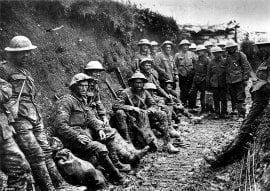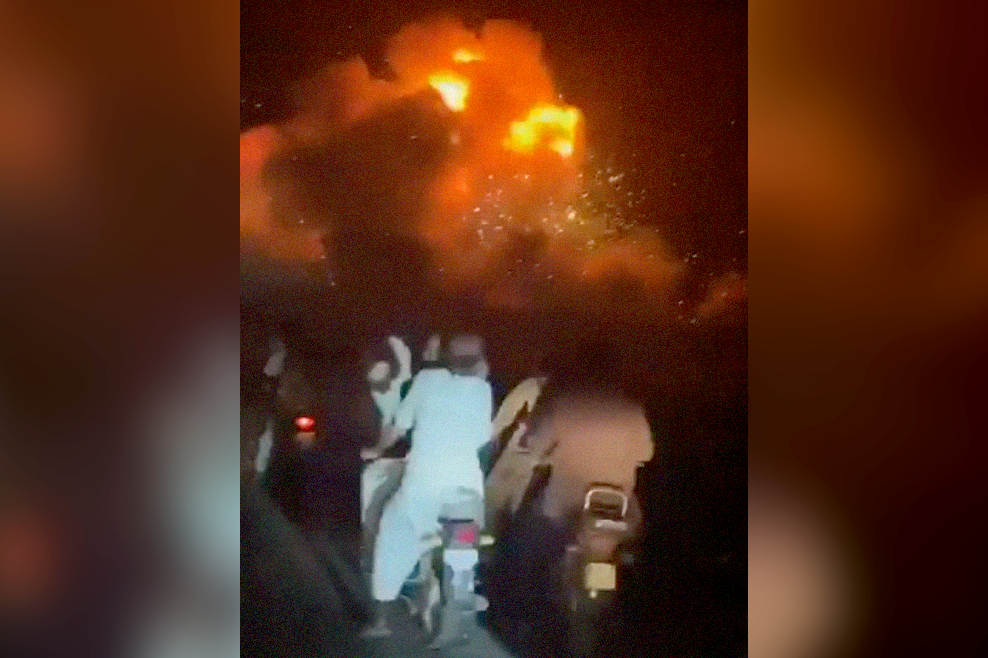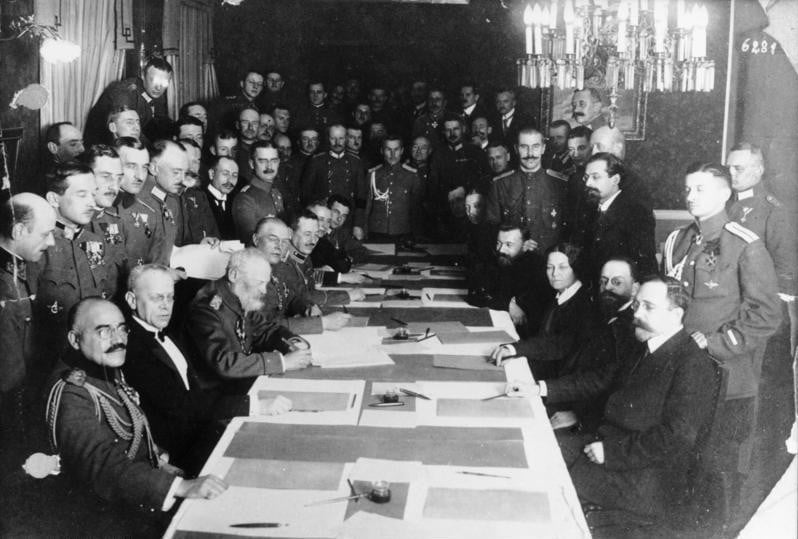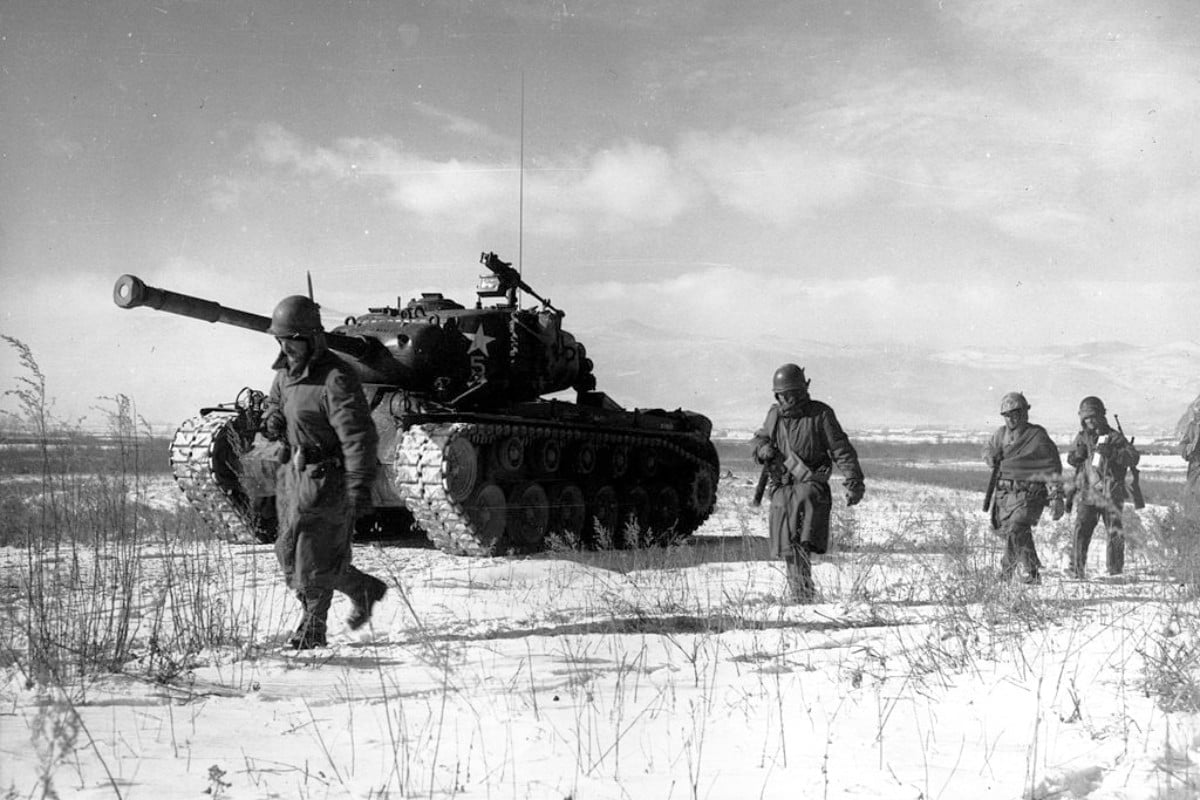As the New Year dawns, memories are reawakening of another New Year, exactly a century ago, the dawn of 1914 when millions of people were drifting towards the abyss as if in a dream. Alan Woods looks back at the beginnings of the First World War and examines the possibilities of world war today.
As the New Year dawns, memories are reawakening of another New Year, exactly a century ago, the dawn of 1914 when millions of people were drifting towards the abyss as if in a dream.
On that New Year’s Day few people imagined what lay in store. One hundred years had passed since the Battle of Waterloo and the memory of war had faded – at least in Britain. The war in South Africa had been a mere skirmish and had ended in victory. The Empire upon which the sun never set seemed assured in its worldwide supremacy.
Across the Channel, it is true, things were not quite the same. Memories of the Franco-Prussian war and the German occupation of Alsace-Lorraine still remained. The General Staff longed for revenge, but on the streets of Montmartre the cafes were bustling and war did not seem an imminent prospect.
For most of the 19th century the Bible of the bourgeoisie was Liberalism, the political expression of a firmly-held belief that the rise of capitalism was a guarantee of human progress. Most of the countries of Western Europe had passed through a period of economic prosperity that seemed as if it would last forever. The new technology—the telephone, the steamship, the railroads had played a far more revolutionary role in pulling the world together than has the Internet in our own times.
Peace and prosperity were regarded as the normal state of affairs: “today better than yesterday and tomorrow better than today”. Many believed that Europe’s economies were so integrated that war was impossible. The rapid development of science and technology were proof of the steady march of progress, a cast-iron guarantee of the superiority of Western Civilization. Yet in August 1914 that beautiful dream ended in a horrific nightmare. Reason became Unreason. Europe and the whole world plunged into a macabre dance of death.
Overnight everything turned into its opposite. Modern technology, from being a potent agent of progress, became transformed into a means of producing the most devilish means of mass destruction, creating unprecedented havoc on a terrifying scale. In place of free trade, protectionist barriers were erected everywhere. In place of Liberalism and democracy there was militarism, censorship and dictatorship in an open or disguised form. At least nine million people lost their lives in the Great Slaughter.
The causes of war
The conclusion frequently drawn is that wars and conflicts are an inevitable result of the natural aggressiveness of the human species (or of men, if one is to believe certain feminists). In reality, this is an explanation that explains nothing. If humans are naturally aggressive, why is it that we are not always in a state of war? Why does society not simply tear itself apart?
In reality, the periodic outbreak of wars is an expression of the tensions that arise in class society, which can reach a critical point in which the contradictions can only be solved by violent means. This idea was already explained by Clausewitz in his celebrated dictum: “war is only the continuation of politics by other means.” In order to explain the causes of the First World War (which we will deal with in detail in future articles) the scientific method of Marxist analysis is necessary.
In the final analysis, the war was the product of the belated rise of Germany which had taken the capitalist road later than Britain and France. This created new and unbearable contradictions. Germany found itself hemmed in and strangled by its powerful rivals who enjoyed the advantages of Empire. Having gained an easy victory over France in 1871, the ruling clique in Berlin was looking for an excuse for a war that would allow it to dominate Europe and grab territory, markets and colonies.
Does this mean that Germany was responsible for the War? The idea that one can place the blame for war on a particular nation is false and superficial, just as is apportioning blame on the basis of “who fired the first shot”. The German army invaded Belgium, and this was no doubt a terrible experience for the Belgian people. But far more terrible was the suffering of millions of colonial slaves in the Congo which was under the rule of “poor little Belgium”.
The French imperialists wanted to take back Alsace and Lorraine, seized by Germany in 1871. But they also wished to seize the Rhineland and subject the German people to oppression and plunder, as we later saw in the Treaty of Versailles. The British imperialists were fighting a “defensive war” – that is to say, a war to defend their privileged position as the foremost imperialist robber in the world, holding countless millions of Indians and Africans in colonial slavery. The same cynical calculations may be discerned in the case of every one of the belligerent nations, from the biggest to the smallest.
Looking backwards, with the wisdom of hindsight, it is not difficult to understand the reasons for the catastrophe of 1914. There were many other factors, such as the conflict between Russia and Austro-Hungary for mastery of the Balkans and the ambitions of Tsarism to seize Constantinople from the palsied hands of a dying Ottoman Empire. The bloody savagery of the Balkan Wars of 1912-13 was a warning, and on several occasions the Great Powers almost came to blows before 1914.
Yet despite all the warning signs, many people believed war would not happen. Britain and Germany were each other’s biggest trading partners after the USA. Surely they would not fight each other? Even now, a hundred years later, some learned academics (God save us from learned academics!) argue that the Great War was not at all necessary, that a diplomatic solution could have been found and that humanity could have avoided a great deal of unnecessary inconvenience and lived happily ever after.
One hundred years after the Great Slaughter, it is customary, not only for our learned academic friends, not only for sentimental pacifists, but also bourgeois politicians to weep oceans of crocodile tears over the “uselessness of war”, the futile loss of life and so on and so forth. We must “learn from history”, they inform us, so that it is never repeated. The fact that every day thousands of people continue to be slaughtered in wars seems to escape their attention. Five million at least have perished in the Congo, which shows how right Hegel was when he wrote that the only lesson one can draw from history is that nobody ever learned anything from it.
If only the conduct of world affairs could be removed from the incompetent hands of politicians, bankers and generals and handed over to the learned and infinitely wise ladies and gentlemen of the universities! If only the world could be governed by the gentle hand of Reason! What a happy place it would be! Unfortunately, the entire course of human history for at least ten millennia has proven that the affairs of humankind have never been governed by Reason. That was already pointed out by Hegel who, despite his Idealist prejudices, often came close to the truth, as when he wrote that it is interests and not Reason that governs the lives of nations.
Why has there not been another world war in the recent period?
Is it possible to draw useful parallels between the state of affairs in 1914 and today? Historical analogies can be useful within certain limits, but it is always necessary to bear these limits firmly in mind. History does indeed repeat itself, but it never does so in exactly the same way.
The most essential parallel is that today the contradictions of capitalism have emerged once more in an explosive manner on a world scale. A long period of capitalist expansion – which bears some striking similarities to the period that preceded the First World War – came to a dramatic end in 2008. We are now in the throes of the most serious economic crisis in the entire 200 year history of capitalism.
Contrary to the theories of the bourgeois economists, globalization did not abolish the fundamental contradictions of capitalism. It only reproduced them on a far vaster scale than ever before: globalization now manifests itself as a global crisis of capitalism. The root cause of the crisis is exactly the same as in 1914: the revolt of the productive forces against the two fundamental obstacles that are preventing human progress, private ownership of the means of production and the nation state.
Ex-Marxists like Eric Hobsbawm believed that globalization would put an end to national conflict. The revisionist Karl Kautsky said exactly the same thing a hundred years ago. The First World War showed the hollowness of that theory. And the state of our world in 2014 shows the stupidity of Hobsbawm’s neo-revisionism. How much more profound was Lenin, whose classic book Imperialism, the Highest Stage of Capitalism is as fresh and relevant now as the day it was written.
Yet there are important differences. On two occasions the imperialists tried to solve their contradictions by war: in 1914 and 1939. Why can this not happen again? As a matter of fact, the contradictions between the imperialists are now so sharp that in the past they would already have led to war. The question that must be asked is: why is the world not at war once more?
The answer is in the changed balance of forces on a world scale. There would be no point in Germany invading Belgium or seizing Alsace-Lorraine, for the simple reason that Germany already controls the whole of Europe through her economic might. All the important decisions are taken by Merkel and the Bundesbank, without a single shot having been fired. Maybe France can start a war of national independence from Germany? It is sufficient to pose the question to see immediately its absurdity.
The fact of the matter is that the old pygmy states of Europe long ago ceased to play any independent role in the world. That is why the European bourgeoisie were forced to form the European Union, in an effort to compete with the USA, Russia and now also China on a world scale. But a war between Europe and any of the above-mentioned states is entirely ruled out. Apart from anything else, Europe lacks an army, navy and air force. Such armies that exist are kept jealously under the control of the different ruling classes, who, behind the facade of European “unity”, are fighting like cats in a sack to defend their “national interests”.
From a military point of view, no country can stand against the colossal military might of the USA. But that power also has limits. There are glaring contradictions between the USA, China and Japan in the Pacific. In the past that would have led to war. But China is no longer a weak, backward, semi-colonial nation that could be easily invaded and reduced to colonial servitude. It is a growing economic and military power, which is flexing its muscles and asserting its interests.
The USA has already burned its fingers badly in Iraq and Afghanistan. It was unable to intervene in Syria. How could it even consider a war with a country like China when it cannot even respond to the continuous provocations from North Korea? The question is a very concrete one.
War and revolution
Before 1914 the illusions of the bourgeoisie were shared by the leaders of the Labour Movement in Western Europe. The Social Democratic leaders, while paying lip service to the ideas of socialism and the class struggle and making radical sounding and even revolutionary speeches on the First of May, in practice had abandoned the perspective of socialist revolution in favour of reformism: the notion that peacefully, gradually, painlessly, they could transform capitalism into socialism at some distant time in the future.
In one international congress after another the Social Democrats – who included at that time Lenin, Trotsky, Rosa Luxemburg and Karl Liebknecht – voted for resolutions pledging the International to oppose any attempt of the imperialists to launch a war, and even to take advantage of the situation to organise a revolutionary struggle against capitalism and imperialism.
To their eternal shame, all the leaders of the Second International (with the exception of the Russians, Serbs and Irish) betrayed the working class by supporting “their” ruling class on “patriotic” grounds. As a result, millions of workers in uniform were condemned to death in the muddy killing grounds of Flanders. The rallying call of “workers of the world unite” appeared to be a grim irony as German, French, Russian and British workers shot and bayoneted each other to death in the interests of their masters. The situation seemed utterly hopeless. Yet the imperialist war ended in revolution.
The Russian Revolution offered humanity a way out of the nightmare of wars, poverty and suffering. But the absence of a revolutionary leadership on an international scale meant that this possibility was aborted in one country after another. The result was a new crisis and a new and even more terrible imperialist war, which led to the deaths of 55 million people and almost caused the collapse of human civilization.
Two World Wars were sufficient proof that the capitalist system had completely exhausted its potential for progress. But Lenin pointed out that unless it is overthrown by the working class, capitalism can always find a way out of even the deepest economic crisis. What Lenin saw as a theoretical possibility in 1920 actually occurred after 1945. As the result of a peculiar concatenation of historical circumstances, the capitalist system entered into a new period of upswing. The prospect of socialist revolution, at least in the developed capitalist countries, was postponed.
Just as in the two decades before 1914, the bourgeoisie and its apologists were drunk with illusions. And just as then, the leaders of the Labour Movement echoed these illusions. Even more than then, they have abandoned any pretence of standing for socialism and have wholeheartedly embraced “the market”. But now the wheel has turned full circle. In 2008 the fruit of success turned to ashes in their mouths. As in 1914 history has given them a rude awakening.
Many people on the Left ask why, if there is such a deep crisis, the masses have not risen. Those who ask such questions we refer to 1914. Why did that crisis not lead immediately to a revolutionary movement? Why did the workers flock enthusiastically to the flag? Here formal logic and abstract generalisations will provide no answer. Only a knowledge of dialectics can shed light on the question.
Unlike idealists, who think that human consciousness is the driving force of all progress, dialectical materialism explains that human consciousness is extremely conservative. Men and women always cling to what is familiar: tradition, habit and routine weigh heavily on the brain. Capitalism breeds lifelong habits of obedience, which are easily transferred from the school to the factory production line and thence to the barracks.
The ruling class has a thousand ways of moulding consciousness: the school, the pulpit, the mass media and above all that invisible but powerful force we call public opinion. The masses will always take the road of least resistance, until the hammer blows of great events compel them to begin to question the values, the morality, the religion and the beliefs that have shaped their thinking all their lives.
This process takes time. It is not a straight line, but very contradictory. The same soldiers who waved flags and sang patriotic songs in August and September 1914 were the ones who took up the red flag and sang the Internationale three or four years later. An immense gulf separated the two phenomena – a gulf filled with immense suffering, horrors and death. It was a hard lesson, but it was a lesson well learned.
What of today? There is no war, at least not in the sense of 1914. But from the standpoint of history the year 2008 will be seen to have been as great a turning point as then. The great learning process has begun. Does it seem too slow for you? But history proceeds according to its own laws and at its own speeds, which cannot be made any faster by impatience.
In 1806, when he was completing his great “voyage of discovery” The Phenomenology of Mind, Hegel saw Napoleon riding through the streets of Jena and exclaimed: “I have seen the World Spirit on horseback!” The Bible says: “Eyes have they but they do not see.” Look around you! Can you not see already evidence of a change in the situation? On the streets of Istanbul and Athens, Sao Paolo and Madrid, Cairo and Lisbon, the masses are beginning to move.
Today we can say that the Spirit of a New World is on the march everywhere, not in the shape of an individual hero, but in the person of millions of nameless heroes and heroines who are slowly but surely drawing conclusions and moving into action to take their own destiny into their hands.
Lenin said: “capitalism is horror without end.” The bloody convulsions that are spreading throughout the world show that he was right. Middle class moralists weep and wail about these horrors, but they have no idea what the causes are, still less the solution. Pacifists, “Greens”, feminists and others point to the symptoms but not the underlying cause, which lies in a diseased social system that has outlived its historical role.
The horrors we see before us are only the outward symptoms of the death agony of capitalism. But they are also the birth-pangs of a new society that is fighting to be born. It is our task to cut short these birth pangs and hasten the birth of a new and genuinely human society.
Somebody once told the Spanish revolutionary Durruti: “You will be sitting on top of a pile of ruins if you are victorious”. To which Durruti answered:
“We have always lived in slums and holes in the wall. We will know how to accommodate ourselves for a time. For, you must not forget, we can also build. It is we who built these palaces and cities, here in Spain and in America and everywhere. We, the workers, we can build others to take their place. And better ones. We are not in the least afraid of ruins. We are going to inherit the earth. There is not the slightest doubt about that. The bourgeoisie might blast and ruin its own world before it leaves the stage of history. We carry a new world, here, in our hearts. That world is growing this minute.”






